Helen Lowe's Blog, page 301
April 15, 2011
Why Write Epic Fantasy?
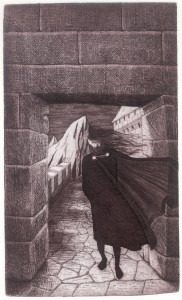
The Keep of Winds, from "The Heir of Night" -- art by PJ Fitzpatrick
Having started to reflect on epic fantasy here on the blog, particularly what the "core" of the genre is, I've also started looking around on the internet to see what other folk are thinking or saying. And I have to say, as an epic fantasy lover and author myself, I potentially found it quite depressing. To understand why, here's a sample of some of the things I read:
 epic fantasy as a genre is misogynist, both in the storytelling and the attention paid to female authors of the genre (i.e. your chances of being a successful epic fantasy author are considerably reduced if you're a gal);
epic fantasy as a genre is misogynist, both in the storytelling and the attention paid to female authors of the genre (i.e. your chances of being a successful epic fantasy author are considerably reduced if you're a gal);
 epic fantasy glorifies violence for its own sake;
epic fantasy glorifies violence for its own sake;
 epic fantasy in particular (and fantasy in general) is reactionary and about denying change, growth and/or renewal;
epic fantasy in particular (and fantasy in general) is reactionary and about denying change, growth and/or renewal;
 other genres, such as romance, paranormal urban fantasy, crime and YA generally all sell a lot better than epic fantasy, so a writer has a considerably enhanced chance of a successful career if s/he switches to one of these genres.
other genres, such as romance, paranormal urban fantasy, crime and YA generally all sell a lot better than epic fantasy, so a writer has a considerably enhanced chance of a successful career if s/he switches to one of these genres.
Depressed, 'you won't be after the next exciting instalment of …' But you may recall that I said "potentially" depressed, because I refuse to be actually depressed even if all this is true. So why is that?
Firstly, I love epic fantasy as a genre. Not necessarily every example that's ever been penned, especially if the stories are misogynistic, reactionary and glorify violence (which sadly, I feel some do), but the genre itself. Remembering that epic fantasy at its best is all about the ability to address the grand sweep of events, in many cases world altering, ask the big questions and use the play of those events to examine the internal conflicts they generate within the protagonists. Great stuff, in my opinion—I love reading it, so it's perhaps not surprising that I write it as well.
But there are other reasons, I believe, for choosing to write epic fantasy.
epic fantasy is also high fantasy (I note that one commenter suggested these can also be separate genres in their own right, but I will explore that point further another time) and allows the author to write stories that operate at the mythic and legendary level of storytelling, in the same way as the epic sagas such as the Argonautika, Beowulf and the Morte d'Arthur, to name just a few;
All SFF allows the author to explore 'what if' and 'wonder' and to speculate on the how and why of other worlds, but because of its grand sweep and focus on world altering events, epic fantasy—more than any other in my opinion—allows the author to speculate on the behaviour of characters and societies. Several reviewers have already commented on the matter-of-fact equality of men and women in the Derai society of The Heir of Night . The opportunity to "just do" this, without either "discussion or worthy treatise" (SFX) is part of what it means to write speculative fiction.
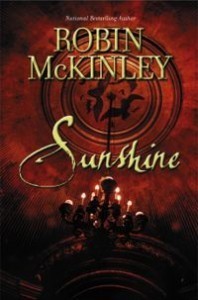 All SFF requires the writer to do a certain amount of world building, but while urban fantasy is almost-but-just-not-quite-our-everyday-world (Robin McKinley's Sunshine is a great example of this) and steampunk draws heavily on what we know of late 18th-19th century history, epic fantasy requires world building on a, well, epic scale. The world is usually completely alternate to ours and has the possiblity of other beings, cultures, societies, and ways of doing things: fan-tastic.
All SFF requires the writer to do a certain amount of world building, but while urban fantasy is almost-but-just-not-quite-our-everyday-world (Robin McKinley's Sunshine is a great example of this) and steampunk draws heavily on what we know of late 18th-19th century history, epic fantasy requires world building on a, well, epic scale. The world is usually completely alternate to ours and has the possiblity of other beings, cultures, societies, and ways of doing things: fan-tastic.In the end all fiction is about storytelling and in my experience epic fantasy, contains some of the very best stories, with grandeur and sweep, "what-if" ideas, a sense of wonder, intriguing worlds and tremendous passion and heart. Put quite simply, a significant number of epic fantasy stories rock! I love them—and that's why I write them, too.
—
If you have enjoyed this post you may also like to read:
April 14, 2011
Sir Julius Vogel Award Finalists 2011: The Full List Now Out
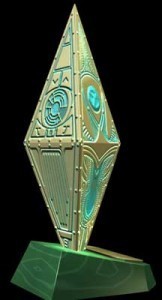
The Sir Julus Vogel Award
The full list of finalists for the Sir Julius Vogel Awards 2011 for Science Fiction, Fantasy and Horror has now officially been published here. (The award, by the way, is designed by Weta.)
As announced yesterday, I am delighted that The Heir of Night is one of this year's finalists for Best Novel. I am also particularly pleased that the map from The Heir of Night, drawn by Peter Fitzpatrick, is a finalist for the Sir Julius Vogel Award for Best Professional Artwork.
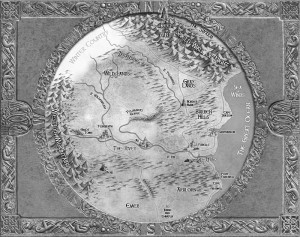
Map design by Peter Fitzpatrick
If you're interested in maps and their evolution as part of an epic fantasy like Heir, you may also like to check Peter's and my guest post on Harper Voyager last year: Introducing The Heir of Night Map. In it Peter describes his process for creating the map, which I personally found fascinating—but then I'm an SFF map geek, so no surprises there.:)
Personally, I think the Sir Julius Vogel Award finalists this year make a very strong showing—a great tribute to the SFF currently being created in New Zealand. But don't just take my say so: check out some of the works—if you haven't done so already—and consider coming to ConText and attending the award ceremony.
As you may recall from my post of April 6, I'll be there and am looking forward to maybe meeting some of you in person if you can make it too.
Best Novel
Barking Death Squirels
Douglas A. Van Belle
Random Static
The Heir Of Night
Helen Lowe
Orbit
The Questing Road
Lyn McConchie
Tor Books
Tymon's Flight
Mary Victoria
HarperCollins Publishers Australia
Geist
Philippa Ballantine
Ace
Best Young Adult Novel
Aria
Rowina De Silva
AM Publishing, New Zealand
Ebony Hill
Anna Mackenzie
Random House
Guardian Of The Dead
Karen Healey
Allen And Unwin
Into The Wilderness
Mandy Hager
Random House
Summer Of Dreaming
Lyn McConchie
Cyberwizard Productions
Best Novella / Novelette
A Tale Of The Interferers – Hunger For Forbidden Flesh
Paul Haines
Available In:
Andromeda Spaceways Inflight Magazine #46
L
Bill Direen
Available In:
A Foreign Country: New Zealand Speculative Fiction
Random Static
Her Gallant Needs
Paul Haines
Available In:
Sprawl Anthology, Twelfth Planet Press
Best Short Story
Consumed
Lee Murray
Available In:
A Foreign Country: New Zealand Speculative Fiction
Random Static
High Tide At Hot Water Beach
Paul Haines
Available In:
A Foreign Country: New Zealand Speculative Fiction
Random Static
The Future Of The Sky
Ripley Patton
Available In:
A Foreign Country: New Zealand Speculative Fiction
Random Static
The Interview
Darian Smith
Available In:
Andromeda Spaceways Inflight Magazine #49
I've Seen This Man
Paul Haines
Available In:
Scenes From The Second Storey
Morrigan Books
Best Collected Work
A Foreign Country – New Zealand Speculative Fiction
Anna Caro and Juliet Buchanan (Eds)
Random Static
The Care And Feeding Of Your Lunatic Mage
Douglas A. Van Belle
Andomeda Spaceways Special Project
2010 Semaphore Anthology
Marie Hodgkinson (ed)
Best Artwork
Barking Death Squirrels Cover
Emma Weakley
Random Static
Internal map in Heir Of Night
Peter Fitzpatrick
Orbit
Tymon's Flight Cover
Frank Victoria
HarperCollins Publishers Australia
Australia
Best Dramatic Presentation
Although only one episode from each
programme has been listed as nominated,
each series is a continuous story. The nominator
suggests that your vote be considered as a vote
for the series as a whole.
This Is Not My Life – Pilot Episode
Executive Producers:
Gavin Strawhan
Rachel Lang
Steven O'Meagher
Tim White
Producer: Tim Sanders
Directors:
Rob Sarkies
Peter Salmon
Associate Producer: Polly Fryer
Kaitangata Twitch – Pilot Episode
Yvonne Mackay
Production Shed TV
Best Production / Publication
Semaphore Magazine
Marie Hodgkinson
White Cloud Worlds Anthology
Paul Tobin (Ed)
The Art Of District 9: Weta Workshop
Daniel Falconer (Ed)
White Cloud Worlds Art Exhibition
The New Dowse Art Gallery
Leanne Wickham (Curator)
Fan Award Nominees
Fan Production
Dr Who – Podcast
Paul Mannering
BrokenSea Audio Productions
The Cloud
Paul Mannering
BrokenSea Audio Productions
Fan Publication
Novazine
Jacqui Smith
Au Contraire Convention Booklet
Au Contraire Committee
Fan Writing
Strange Matter
John Toon
Appearing In:
Phoenixine – The Magazine Of The Phoenix Science Fiction Society Inc.
Musings From Under The Mountain
And Novazine Contributions
Jacqui Smith
Appearing In:
Novazine – The Magazine Of Stella Nova
Blue
Michele Powles
Available at her website
Uncorked
Broderick Wells
Appearing In:
Novazine – The Magazine Of Stella Nova
Fan Artwork
Cover For: StarshipSofa 150
Gino Moretto
April 13, 2011
Sir Julius Vogel Awards 2011: "The Heir of Night" a Finalist
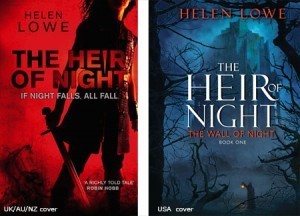 Yesterday, I was delighted to learn that The Heir of Night (HarperVoyager USA; Orbit UK/AU/NZ) is amongst the finalists for the Sir Julius Vogel Award 2011 for Best Novel (Adult.)
Yesterday, I was delighted to learn that The Heir of Night (HarperVoyager USA; Orbit UK/AU/NZ) is amongst the finalists for the Sir Julius Vogel Award 2011 for Best Novel (Adult.)
The Sir Julius Vogel Awards are made annually by the Science Fiction & Fantasy Association of New Zealand (SFFANZ) and recognize achievement in Science Fiction, Fantasy and Horror by New Zealanders. In order to be eligible, a work needs to have been "created by a New Zealander and first published or released in the 2010 calendar year."
A full list of finalists has not yet been published on the Sir Julius Vogel Awards site but I expect that it will be in the next few days.
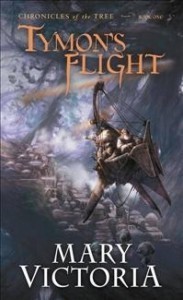 Meanwhile, I do know that my friend novel, Tymon's Flight (HarperVoyager), is a finalist, too—also great news. Mary is a finalist for the Award for Best New Talent as well and both nominations are very well deserved (imho.)
Meanwhile, I do know that my friend novel, Tymon's Flight (HarperVoyager), is a finalist, too—also great news. Mary is a finalist for the Award for Best New Talent as well and both nominations are very well deserved (imho.)
April 12, 2011
More Thoughts on Epic Fantasy
I finished my Monday post, More on Epic Fantasy, with:
"So does a book have to be about large-scale war to qualify as epic fantasy? I don't believe so, but I do feel its has to encompass, in some way, the grand sweep of events—and large-scale war can serve as convenient shorthand for that."
In between times, while I've been dwelling in the realm of Tuesday Poem (where our first anniversary group composition is about the myth of the Norse god Tyr and the wolf, Fenris—how epic is that?) I have been mulling over this question. Most particularly, I have been trying to think of individual books and/or series that I would categorise as epic fantasy that aren't about large-scale war. And have actually found the exercise quite, well, exercising, given that my criteria are that, in order to be epic, a story must encompass some or all of:
" … the epic sweep of events, encompassing nations, cultures and the "winds of change sweeping through the corridors of power" [or "world altering" as Ted Cross perhaps better expressed it in his comment on my post]—in whatever way seems appropriate to the context of the story."
So here's my "top 3″ contenders so far (and yes, I would love to hear your suggestions as well):
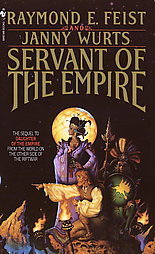 Janny Wurts and Raymond E Feist's
Empire
trilogy comprising A Daughter of the Empire, Servant of the Empire and Mistress of the Empire. Although there is a large-scale war going on in the background of the first and (I'm pretty sure) second books, this is very much 'remote backdrop' and not pertinent to the central story, which is all about the "game of the council" (ie politics and socio-political manipulation and machination within the empire of Tsurani.) But the success of the central character, Mara of the Acoma, and the outcome of her influence on the game of the council is widespread socio-political change in the empire. Coupled with the epic sweep of the trilogy, I feel that definitely places the Empire series in the epic fantasy camp.
Janny Wurts and Raymond E Feist's
Empire
trilogy comprising A Daughter of the Empire, Servant of the Empire and Mistress of the Empire. Although there is a large-scale war going on in the background of the first and (I'm pretty sure) second books, this is very much 'remote backdrop' and not pertinent to the central story, which is all about the "game of the council" (ie politics and socio-political manipulation and machination within the empire of Tsurani.) But the success of the central character, Mara of the Acoma, and the outcome of her influence on the game of the council is widespread socio-political change in the empire. Coupled with the epic sweep of the trilogy, I feel that definitely places the Empire series in the epic fantasy camp..
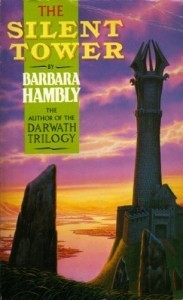 My second pick was Barbara Hambly's
Windrose
trilogy: The Silent Tower, The Silicon Mage and
Dog Wizard
. Once again, the story does not revolve around large-scale war but there is considerable sweep of events in terms of the use and abuse of power, stresses within a society of wizards and witchfinders, and a quest to save not only the world but prevent the death of the universe—I do think that qualifies as fairly epic stuff.
My second pick was Barbara Hambly's
Windrose
trilogy: The Silent Tower, The Silicon Mage and
Dog Wizard
. Once again, the story does not revolve around large-scale war but there is considerable sweep of events in terms of the use and abuse of power, stresses within a society of wizards and witchfinders, and a quest to save not only the world but prevent the death of the universe—I do think that qualifies as fairly epic stuff..
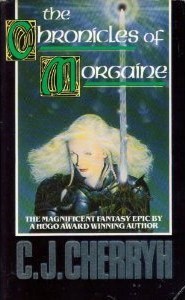 My third choice is CJ Cherryh's
Chronicles of Morgaine
(comprising Gates of Ivrel, Well of Shuian and Fires of Azeroth) in which the sweep of events is definitely epic and the heroine effectively a "half-elf" (in type, that is not how she is styled in the book) with a highly destructive sword (Changeling) on a quest to save the universe by destroying the time-traveling gates that will otherwise unravel it. While I concede that the premise of the story is fundamentally science fiction, the action is primarily psychological and ethical, and both the culture of the story and the technologies of the worlds Morgaine visits (in order to destroy their gates) are all low tech and quasi-medieval. So I always think of Morgaine as epic fantasy—and I understand the author does, too, so I'm going to stick with that.
My third choice is CJ Cherryh's
Chronicles of Morgaine
(comprising Gates of Ivrel, Well of Shuian and Fires of Azeroth) in which the sweep of events is definitely epic and the heroine effectively a "half-elf" (in type, that is not how she is styled in the book) with a highly destructive sword (Changeling) on a quest to save the universe by destroying the time-traveling gates that will otherwise unravel it. While I concede that the premise of the story is fundamentally science fiction, the action is primarily psychological and ethical, and both the culture of the story and the technologies of the worlds Morgaine visits (in order to destroy their gates) are all low tech and quasi-medieval. So I always think of Morgaine as epic fantasy—and I understand the author does, too, so I'm going to stick with that.So what do you think: do you agree that my 3 picks qualify as examples of epic fantasy that don't involve large-scale war? Disagree? Have a top three of your own? (Just remember that to qualify these fantasies have to be epic in scope, as above, and not about large-scale war.)
April 11, 2011
Tuesday Poem: "Castle Rock"
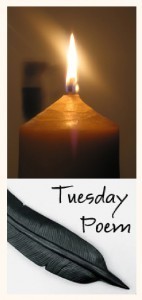 A week and 26 poets later, the Tuesday Poem Blog community's birthday poem is complete. Definitely a "wow" moment—and please do take a moment to read it on the hub, here.
A week and 26 poets later, the Tuesday Poem Blog community's birthday poem is complete. Definitely a "wow" moment—and please do take a moment to read it on the hub, here.
—
Castle Rock
Rotating in mid-air,
suspended between blue above,
bleached tussock below,
face to face with the ragged crag
of Castle Rock, sun flashes
off her watch, dazzling
as the first time they met
in the Roxborough fish and chip
shop, high above the Clutha River:
his presence, blazing in,
was like the sun rising,
spilling over energy, snaring her
with his eagerness for living –
dazzled then too, but now
her eyes clear, take in hill, sky,
rock, as someone shouts – she kicks
hard into the face, finds purchase
as the rope plays out.
.
(c) Helen Lowe
.
~ first published, The Christchurch Press, July 18, 2007;
~re-published, Crest to Crest: Impressions of Canterbury Prose & Poetry, Ed. Karen Zelas, Wily Publications, 2009
—
The reason for selecting Castle Rock for this week's Tuesday poem, is that last week I saw this post, Our Changed Landscape: Castle Rock, Te Tihi o Kahukura, on the Christchurch City Libraries' Blog. The post laments a loss of part of the face of Castle Rock during Christchurch's 7.1 earthquake of 4 September 2010. Although I understand intellectually that change is part of life, emotionally I feel the loss of landmarks such as this—because both as Port Hills' natural feature and a favourite haunt for rock climbers, Castle Rock has been an integral part of our cityscape since its founding. And a sense of place, I believe, is part of what gives us our sense of belonging and a basis for cultural identity.
April 10, 2011
"The Heir of Night" is Reviewed Again—In German:)
Recently, I reported that Thornspell had been reviewed in Italian. And now "The Heir of Night" has been reviewed on a German blog. Of course, the review is in German, so I can't actually read it [grins], but the reviewer did comment here to say that:
" … I've just finished reading The Heir of Night … it was fun to read … Looking forward for book 2.″
So I figure the review is probably on the plus side. But if you can read German then you can find out—and possibly report back  — here.
— here.
A few more UK links for "The Heir of Night" have come through recently as well, with Andy Venn on Walker of Worlds blog finding it: "a cracking story … It gallops along a rate of knots that almost leaves you gasping for breath, but I still found it very hard to put down."
You can read the full review here.
And Cheryl Morgan of Salon Futura, in her "The Class of 2010″ snapshot of new writing from last year also includes a closer look at Heir as "not your typical fantasy world", with a particular eye for the cultural nuances of the story. The other writers reviewed are Trent Jamieson, Amelia Beamer and Dexter Palmer.
Click on "The Class of 2010″ link above to read all four reviews.
April 9, 2011
More on Epic Fantasy
Yesterday I shared some thoughts on "epic fantasy" and whether—or not—the reason JRR Tolkien's The Lord of the Rings or George RR Martin's A Game of Thrones have been so successful is because "we're tired of war." These thoughts were sparked by a guest post by Daniel Abrahams on the Orbit blog—but also arose from my earlier Big Idea post on John Scalzi's Whatever in 2010.
(By the way, is there a significant trend with "RR" monikers and hugely successful epic fantasy authors: i.e. should I consider changing my name by deed pole to HRR Lowe or Helen RR Lowe?  )
)
OK, back on topic. The thrust of my premise, in summary, is that stories such as The Lord of the Rings and A Game of Thrones speak to us as readers because of the way in which the internal conflicts of the protagonists, juxtaposed with the external struggles in which they are engaged, speak to our human condition. One obvious way of exploring those struggles and illuminating the associated human issues is through the large-scale wars that characterize the epic fantasy genre.
Another comment that caught my attention though was one by Paul Jessup that asked: " … what about the pre-80′s epic fantasies that didn't involve OMG LARGE SCALE WARS? Like Forgotten Beasts of Eld, Riddlemaster, Earthsea books, etc, etc."
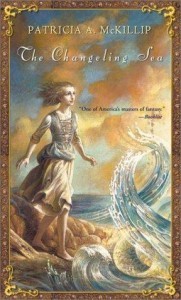 I have just been re-reading Patricia McKillip's The Changeling Sea and thinking all over again how much I love both that book and others that I consider to be "classic McKillip"—which for me include exactly the titles cited by Jessup, i.e. The Forgotten Beasts of Eld and The Riddlemaster of Hed trilogy. I also still rate Ursula Le Guin's initial Earthsea trilogy (A Wizard of Earthsea, The Tombs of Atuan, The Farthest Shore) as amongst the finest Fantasy I've read. But are they epic fantasy? With the exception of Patricia McKillip's The Riddlemaster of Hed trilogy, I am not persuaded that they are.
I have just been re-reading Patricia McKillip's The Changeling Sea and thinking all over again how much I love both that book and others that I consider to be "classic McKillip"—which for me include exactly the titles cited by Jessup, i.e. The Forgotten Beasts of Eld and The Riddlemaster of Hed trilogy. I also still rate Ursula Le Guin's initial Earthsea trilogy (A Wizard of Earthsea, The Tombs of Atuan, The Farthest Shore) as amongst the finest Fantasy I've read. But are they epic fantasy? With the exception of Patricia McKillip's The Riddlemaster of Hed trilogy, I am not persuaded that they are.
Personally, I am not a great one for definition—the main questions for me are always: "was this book a good read?" and "did I love it?" But, but I can't help feeling that in order to be considered epic fantasy the story has to in some way address the epic sweep of events, encompassing nations, cultures and the "winds of change sweeping through the corridors of power"—in whatever way seems appropriate to the context of the story.
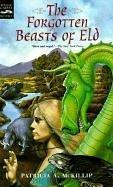 I believe that Patricia McKillip's Riddlemaster trilogy (i.e The Riddlemaster of Hed; Heir of Sea and Fire; and Harpist in the Wind) achieves this epic sweep, but to me The Forgotten Beasts of Eld, like The Changeling Sea operates at a more personal level, i.e. the focus of the story is the personal change and growth of the central protagonist and although in Eld—but not Changeling—there are certainly larger events in the background, these are peripheral to that personal tale. And particularly when I look at McKillip's work (even the Riddlemaster trilogy, although it is muted there) both the scope and structure of the storytelling, as well as the language and imagery of the writing, speak far more to the fairytale tradition than they do to epic fantasy.
I believe that Patricia McKillip's Riddlemaster trilogy (i.e The Riddlemaster of Hed; Heir of Sea and Fire; and Harpist in the Wind) achieves this epic sweep, but to me The Forgotten Beasts of Eld, like The Changeling Sea operates at a more personal level, i.e. the focus of the story is the personal change and growth of the central protagonist and although in Eld—but not Changeling—there are certainly larger events in the background, these are peripheral to that personal tale. And particularly when I look at McKillip's work (even the Riddlemaster trilogy, although it is muted there) both the scope and structure of the storytelling, as well as the language and imagery of the writing, speak far more to the fairytale tradition than they do to epic fantasy.
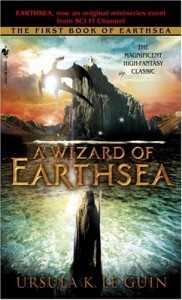 Ursula Le Guin's Earthsea trilogy is also primarily focused at the personal level—the central protagonists in all three books are involved in events where both self-realization and overcoming the (more fallible) self are the core of the tale. Admittedly, an element of "saving the world" creeps into the The Farthest Shore and both that book and A Wizard of Earthsea are strongly focused around the quest/hero's journey—but these tropes are as common to folklore and fairytale as they are to epic sagas.
Ursula Le Guin's Earthsea trilogy is also primarily focused at the personal level—the central protagonists in all three books are involved in events where both self-realization and overcoming the (more fallible) self are the core of the tale. Admittedly, an element of "saving the world" creeps into the The Farthest Shore and both that book and A Wizard of Earthsea are strongly focused around the quest/hero's journey—but these tropes are as common to folklore and fairytale as they are to epic sagas.
I really love all these stories, but I don't think of them as epic fantasy. Then again, they don't have to be: "epic", after, all is only one very small corner of the fantasy 'verse. I do agree with Paul Jessup though, that McKillip and Le Guin provide excellent examples of outstanding fantasy that is not focused on large-scale wars. In fact, war-based conflict does not feature in either The Changeling Sea or the Earthsea books at all.
So does a book have to be about large-scale war to qualify as epic fantasy? I don't believe so, but I do feel its has to encompass, in some way, the grand sweep of events—and large-scale war can serve as convenient shorthand for that.
April 8, 2011
Epic Fantasy
Sometimes the synchronicty of events seems almost uncanny … Only this Monday past, I posted on Winter is coming, talking not only about winter literally being just around the corner here in the southern hemisphere, but also about George RR Martin's novel A Game of Thrones and the about-to-be-released HBO TV series of the same name, based on the book. (If you don't already know then I'll have to insist you read the post to see how the novel and series relate to the tag "winter is coming."  )
)
And on Sunday, when I posted on "What I'm Reading", I mentioned Daniel Abrahams novel, Betrayal in Winter, having discussed his first-in-series Shadow in Summer a little earlier on February 6.
 So I was intrigued, when I popped on to the Orbit blog this morning—just to see what was happening, you know how you do—that Daniel Abrahams had a guest post up talking, amongst other things, about A Game of Thrones and the HBO series. The post discusses, amongst other things, those fantasy stories that: "… celebrate violence, or more often treat it as something unreal and without cost … " So those of you who read my Big Idea post on John Scalzi's Whatever blog, back in October, will probably understand at once why it caught my interest.
So I was intrigued, when I popped on to the Orbit blog this morning—just to see what was happening, you know how you do—that Daniel Abrahams had a guest post up talking, amongst other things, about A Game of Thrones and the HBO series. The post discusses, amongst other things, those fantasy stories that: "… celebrate violence, or more often treat it as something unreal and without cost … " So those of you who read my Big Idea post on John Scalzi's Whatever blog, back in October, will probably understand at once why it caught my interest.
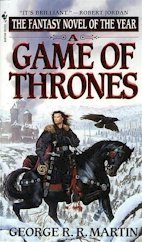 Titled "The Two Tolkiens" (the second being not Christopher, JRR's son, but George RR Martin, author of A Game of Thrones), the premise of Daniel Abraham's post is that books such as The Lord of the Rings and A Game of Thrones are currently "reaching outside the usual genre readers to talk to … [a] … wider audience" because " our two Tolkiens are telling us that we're tired of war."
Titled "The Two Tolkiens" (the second being not Christopher, JRR's son, but George RR Martin, author of A Game of Thrones), the premise of Daniel Abraham's post is that books such as The Lord of the Rings and A Game of Thrones are currently "reaching outside the usual genre readers to talk to … [a] … wider audience" because " our two Tolkiens are telling us that we're tired of war."
Abrahams then advances his case with reference to both books, but concludes that their success doesn't really mean that epic fantasy is back because quite a few fantasies (I would say a lot) are (as above) "… adventure stories that celebrate violence, or more often treat it as something unreal and without cost … " But these, unlike The Lord of the Rings and A Game of Thrones, are not " … the projects that are reaching outside the usual genre readers to talk to the wider audience."
I hope I have now intrigued you enough to go and read the full post here. I definitely do think it's worth it.
You will also, if you read the comments section, see that I question Abrahams' premise. While the facts speak for themselves in terms of the appeal of both Tolkien and Martin (I do have a resistance to the tag of the "Two Tolkiens", but that's another topic …) I am not convinced that it is because "we're tired of war." (As I say in my comment, I'm not convinced that we are tired of war—the evidence of the world around us and the stories that dominate our media seem to suggest otherwise.)
One of the reasons both books have been so popular is, quite simply, because they're damned fine stories. But the case I advanced in my comment, which is fundamentally the same as that contained in my Big Idea post of 21 October 2010, was this:
"In my view, what you have described with LoTR and AGoT is exactly what epic fantasy is–drawing on its roots in both the Greek and Norse (in western tradition) mythic epics (the same ones that initially hooked me into reading fantasy.) In those stories, it is the internal conflict within the protagonists—-their struggle between the pressures of self-interest, the socio-political forces in their societies and the codes they hold to be true and right—-that drive the power, drama and tragedy of the narrative.
The same forces, I believe, are at play in both LoTR and AGoT and that, I can't help feeling, is what is really speaking to us out of both books, rather than a–perhaps–more simplistic weariness of war … We live in a world where any values of "right" and "true" that we are hold as individuals are constantly under pressure, being eroded even, by self-interest and self-preservation and by societal forces driving to achieve particular outcomes in terms of (for example) resource use / allocation and to enforce belief systems. I imagine that most of us try to have "bottom lines" and boundaries that we don't cross—-but we live in a world where boundaries are often blurred and the pressure to push the margins further out, and then just a little further again, is a constant.
This is exactly the pressure that we see played out, time and again, in "A Game of Thrones", and which the characters, through the metaphor of the ring, struggle to resist in "The Lord of the Rings."
Anyway, I do hope you will go to the Orbit blog and read Daniel Abrahams post. As I said above, I really do think it's worth the effort.
I'd also like to hear what you think, especially if you're readers of epic fantasy—but even if you're not you probably have an opinion on whether or not we really are tired of war. And if we are, whether that's why books such as The Lord of the Rings and A Game of Thrones have been so successful.
April 7, 2011
More This 'n' That

T Landry's Tuesday Poem Birthday Cake
Today, Friday 8, I'm on the roster to contribute to the Tuesday Poem Blog's first birthday poem–my lines should be up by mid-day, so here's hoping I don't drop the collective ball! (Gulps!) You can check out how it's all going, here. And I do love the chocolate birthday cake by US poet T Landry—trouble is, I want a real taste of that, not just a virtual one!
I also love the way the progressive poem has evolved out of the legend of the Norse god Tyr, who lost his hand to the wolf Fenris in order to save the rest of the gods … that was always one of my favourite of the Norse myths when I first started reading them as a kid. (Tyr also gave his name to "Tuesday", of course.)
—
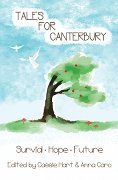 Another project that I'm very enthusiastic about at present is Tales for Canterbury, the short fiction anthology being put together by Cassie Hart and Anna Caro as a fund raiser for Christchurch after the February 22nd story. I'm just putting the finishing touches to The Fountain, which I've donated to the project. Other writers who are contributing work include Neil Gaiman, Karen Healey, Juliet Marillier, Ripley Patton, Mary Victoria and Sean Williams amongst many more. You can read the full list of contributors here.
Another project that I'm very enthusiastic about at present is Tales for Canterbury, the short fiction anthology being put together by Cassie Hart and Anna Caro as a fund raiser for Christchurch after the February 22nd story. I'm just putting the finishing touches to The Fountain, which I've donated to the project. Other writers who are contributing work include Neil Gaiman, Karen Healey, Juliet Marillier, Ripley Patton, Mary Victoria and Sean Williams amongst many more. You can read the full list of contributors here.
You may also like this promotional video put together by Matt Cowens, a fellow contributor.
I will be writing to everyone I know—who does not live in Christchurch  —about Tales for Canterbury and encouraging them to pre-order, but if you are reading this blog and want to both acquire a great anthology and help Chriscthurch and its people post-earthquake, then hie thee to Random Static and preorder here.
—about Tales for Canterbury and encouraging them to pre-order, but if you are reading this blog and want to both acquire a great anthology and help Chriscthurch and its people post-earthquake, then hie thee to Random Static and preorder here.
I reiterate: do not wait, do not pass go—preorder now! (Just to be absolutely clear, not one penny goes to the contributors, editors or publishers—this is all for the earthquake cause.)
—
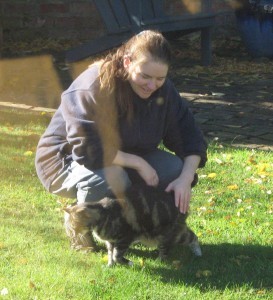 And for those of you who wondered whether, as a writer, it is absolutely necessary also to have a cat, check out Writers and Kitties. You may recall that I established my credentials in this department on January 19.
And for those of you who wondered whether, as a writer, it is absolutely necessary also to have a cat, check out Writers and Kitties. You may recall that I established my credentials in this department on January 19. 
April 6, 2011
This 'n' That
Today is a post of oddments …
 … The Tuesday Poem Blog's first birthday poem (on a theme, directly and/or indirectly, of Tuesday) is growing—and will continue to do so throughout this week. You can check on progress here
… The Tuesday Poem Blog's first birthday poem (on a theme, directly and/or indirectly, of Tuesday) is growing—and will continue to do so throughout this week. You can check on progress here
—
 … Gillian Polack, whom I was on a panel with (can I say "panelled with"?) at Worldcon way back in September '10, has been nominated for a Ditmar Award for the short story anthology Baggage. Way to go, Gillian, I'm cheering from your corner.
… Gillian Polack, whom I was on a panel with (can I say "panelled with"?) at Worldcon way back in September '10, has been nominated for a Ditmar Award for the short story anthology Baggage. Way to go, Gillian, I'm cheering from your corner. 
(Another friend, Mary Victoria, talks more about Baggage (& publisher Eneit Press) here.)
—
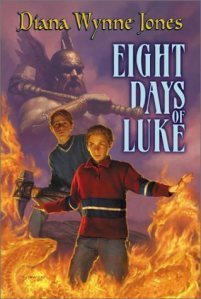 … I read Neil Gaiman's personal/blog tribute for Diana Wynne Jones and I cried, because although (obviously) not for Diana, I've been there all the same for other people:
… I read Neil Gaiman's personal/blog tribute for Diana Wynne Jones and I cried, because although (obviously) not for Diana, I've been there all the same for other people:
"She was on morphine, breathing heavy and hard, as if she was fighting for every breath … there was a sense that felt like a certainty that she wasn't going to open her eyes and talk again. This sleep was final, and soon the breathing would stop … But there was only one Diana Wynne Jones, and the world was a finer one for having her in it.
" — N Gaiman
And of course Neil Gaiman knew DWJ in person, whereas I could only do my small tribute as a reader—but maybe when you're a writer it's good to have both …
—
 I wanted to write another Earthquake Report for today and found I couldn't … Because sometimes the 'quaky aftermath just gets to you and it's all too real and present and altogether "just too much" so that you don't want to talk about it at all … so no piccies of my chimney and what's replaced it (the 'weathertight-for-winter' interim solution which of course is fine, but …) just yet.
I wanted to write another Earthquake Report for today and found I couldn't … Because sometimes the 'quaky aftermath just gets to you and it's all too real and present and altogether "just too much" so that you don't want to talk about it at all … so no piccies of my chimney and what's replaced it (the 'weathertight-for-winter' interim solution which of course is fine, but …) just yet. 
But on a slightly more upbeat note, here's the clip "A Fraction Liquefaction" (an adaptation of the Split Enz hit "There's a Fraction Too Much Friction" ) which is a relatively light-hearted look at the whole February 22nd liquefaction experience and its consequences. So here it is:



